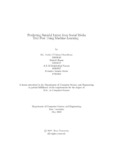| dc.contributor.advisor | Arif, Hossain | |
| dc.contributor.author | Chowdhury, Md. Mubin Ul Islam | |
| dc.contributor.author | Hasan, Mehadi | |
| dc.contributor.author | Nayem, A.K.M Muhibullah | |
| dc.contributor.author | Meem, Humaira Tasnim | |
| dc.date.accessioned | 2023-02-28T05:21:41Z | |
| dc.date.available | 2023-02-28T05:21:41Z | |
| dc.date.copyright | 2022 | |
| dc.date.issued | 2022-05 | |
| dc.identifier.other | ID: 18101640 | |
| dc.identifier.other | ID: 18101657 | |
| dc.identifier.other | ID: 18301117 | |
| dc.identifier.other | ID: 17201103 | |
| dc.identifier.uri | http://hdl.handle.net/10361/17923 | |
| dc.description | This thesis is submitted in partial fulfillment of the requirements for the degree of Bachelor of Science in Computer Science, 2022. | en_US |
| dc.description | Cataloged from PDF version of thesis. | |
| dc.description | Includes bibliographical references (pages 29-30). | |
| dc.description.abstract | We are living in an age of modern science where cutting-edge technology has made
the world so small. We can now easily connect with people worldwide via the internet and using social media. Social media has become a popular way to connect
with people and to share our thoughts and feeling with the people we are connected.
People are using social media as a tool where they share their feelings, daily life
activities and so on. As a result, people are spending more times on those platforms to connect with people rather than in person. People who suffer from suicidal
ideation are expressing their feelings and emotions on social platforms. As suicide
is now an alarming problem in our society, we can use machine learning technology
to determine suicidal ideation in the early stage based on social media data such as
Twitter data and Reddit data. We have combined deep learning and an artificial
neural network to make a model that we have named SIP (Suicidal Intent Prediction) which can detect suicidal ideation based on the text data of social media in
the first place. In our proposed SIP model, we have used Functional, Word Embedding, Dense and GRU (Gated recurrent unit), Bi-directional LSTM, Bert to build
our model. We have shown that our SIP model is able to determine the suicidal
ideation with a higher training accuracy of 88%, a validation accuracy of 89% and
training accuracy 98% and validation accuracy 99% from SIP (Sentiment) model. | en_US |
| dc.description.statementofresponsibility | Md. Mubin Ul Islam Chowdhury | |
| dc.description.statementofresponsibility | Mehadi Hasan | |
| dc.description.statementofresponsibility | A.K.M Muhibullah Nayem | |
| dc.description.statementofresponsibility | Humaira Tasnim Meem | |
| dc.format.extent | 30 pages | |
| dc.language.iso | en | en_US |
| dc.publisher | Brac University | en_US |
| dc.rights | Brac University theses are protected by copyright. They may be viewed from this source for any purpose, but reproduction or distribution in any format is prohibited without written permission. | |
| dc.subject | Suicidal Ideation | en_US |
| dc.subject | Machine Learning | en_US |
| dc.subject | Deep Learning | en_US |
| dc.subject | Neural Network | en_US |
| dc.subject | Social media | en_US |
| dc.subject | Functional | en_US |
| dc.subject | Word Embedding | en_US |
| dc.subject | Dense and GRU | en_US |
| dc.subject | Bert | en_US |
| dc.subject | Bi-directional LSTM. | en_US |
| dc.subject.lcsh | Suicide--Prevention. | |
| dc.title | Predicting suicidal intent from social media text post using machine learning | en_US |
| dc.type | Thesis | en_US |
| dc.contributor.department | Department of Computer Science and Engineering, Brac University | |
| dc.description.degree | B. Computer Science | |

